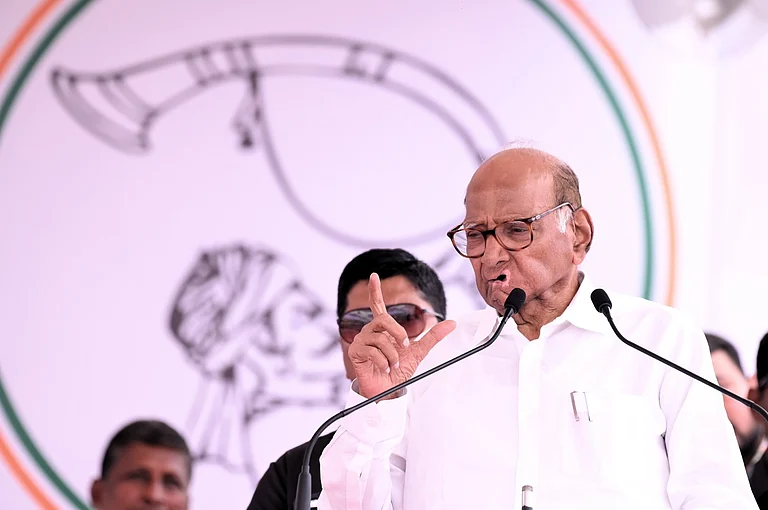Oza's publishers, Konark, weren't just coy. They went so far as to insert an extraordinary declaration in the book: "The responsibility of any kind of correctness and legality (sic) of facts stated or opinion (sic) expressed in the book is entirely of the author and not of the publishers. The publisher (sic) has no responsibility of any kind in regard to the same."
Whether this is adequate legal cover for the evidently worried publishers or not, the cause of their worry, bordering on panic, became clear almost instantly. The book's surreptitious release did not prevent news-hounds from smelling out its sensational—one might say more explosive than the Bofors ammunition—contents, and splashing them across the front pages of several national newspapers. The stories played up three points. First, the ambassador's blow-by-blow account of his escalating frustration over the systematic thwarting by the PMO in New Delhi of his attempts to force Bofors to come clean about the identities of the beneficiaries of its commissions. Secondly, that the overbearing officers of the PMO (some of them colleagues "several years junior to me") always ordered and hectored him on telephone and never responded to his demands for instructions in writing.
Thirdly, and most importantly, Oza's statement that the commission unquestionably received from Bofors by Ottavio Quattrocchi was "bribe money for Rajiv Gandhi".
"The questions to be answered," says Oza, "are: who introduced Quattrocchi to Bofors? Where? When? Why? His was a peculiar contract with Bofors. It was signed in November '85 and terminated in March '86. What job did he do in those five crucial months? The answer is clear. He got the deal swung and in record time. He couldn't have done so without Rajiv Gandhi's support. What more evidence do you want?"
All this and more is familiar to all those who have read the lengthy quotes from the book, spiced with the author's comments in an interview from Los Angeles. However, it is pertinent to point out that Oza's conviction about Rajiv's "culpability" firmed up rather slowly over time. Initially, he subscribed to the general view of the late prime minister as Mr Clean. In fact, when, a little before the scandal about the Howitzer guns for India burst, Bofors got into serious trouble over its shady deals with Oman and Vietnam, Oza had sent a very interesting and "longish" letter to Delhi to explain the firm's wicked ways and the consequent resignation of its then chief, Martin Ardbo. The letter ended with the ringing declaration that, in the midst of these "murky and messy" transactions, the Indian deal "stood out like a lotus"—"pure and clean, in the midst of the filth and dirt surrounding it".
What made Oza change his mind 180 degrees and declare that Mr Clean had turned into "Mr Cover-Up" first and then "Mr Conman", is what the book is all about. He claims that what he has written is exactly what he had told the CBI earlier this year.
No one should blame Oza for having remained silent for so long. When he was transferred out of Stockholm to Prague (which he regarded as a punishment post), he had six years of service left. Even so, he was foolhardy enough, in '92, to apply to P.V. Narasimha Rao for permission to write his memoirs of his association with the Bofors affair. He never received any written reply but was verbally advised, by the then foreign secretary, to wait until after his retirement. When Oza retired in 1994, PV was still PM. He was unlikely to grant the permission denied two years earlier. Thus Oza sat out the compulsory two-year 'cooling off' period. Only after he was examined by the CBI in April did he clear his "chest of Bofors bronchitis".
Incidentally, Narasimha Rao comes out rather poorly from Oza's remembrance of things past. According to him, he had fallen foul of Rao (then external affairs minister) while serving as high commissioner in Singapore, because one of Rao's nephews based in the city-state had taken a dislike for Oza and complained to Uncle. Oza's description of Rao's "nervous and tense" visit to Sweden in '87 to inaugurate the Festival of India is, in parts, hilarious. And Oza says that the posting given to him by Rao as PM (Seoul) was even worse than that given by Rajiv!
Oza's is a slim book: 118 pages of text and another 60 of annexures. Strangely, it has no index. However, given his credentials, it is bound to be read and discussed widely. Especially since the long-drawn-out Bofors issue remains unresolved, notwithstanding the receipt of reams and reams of revealing documents from Sweden and, more importantly, from Swiss banks.


























